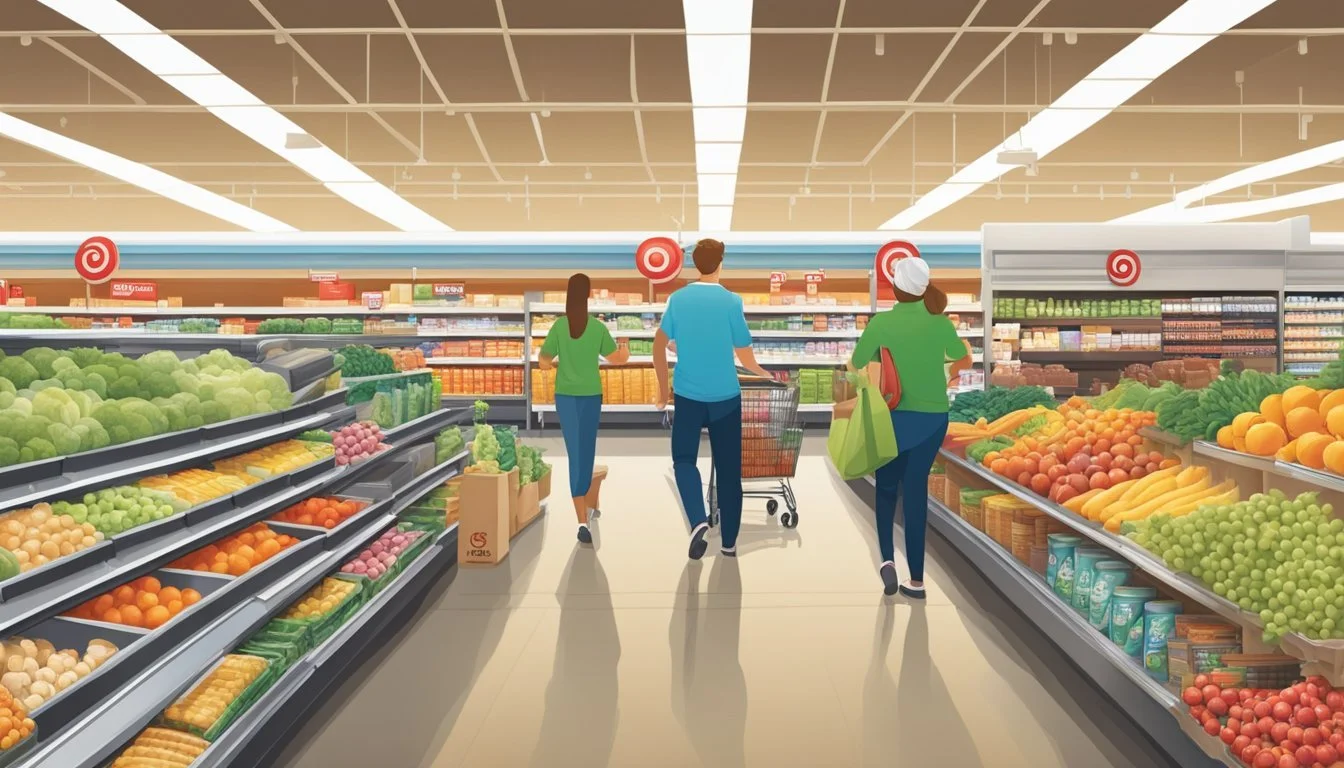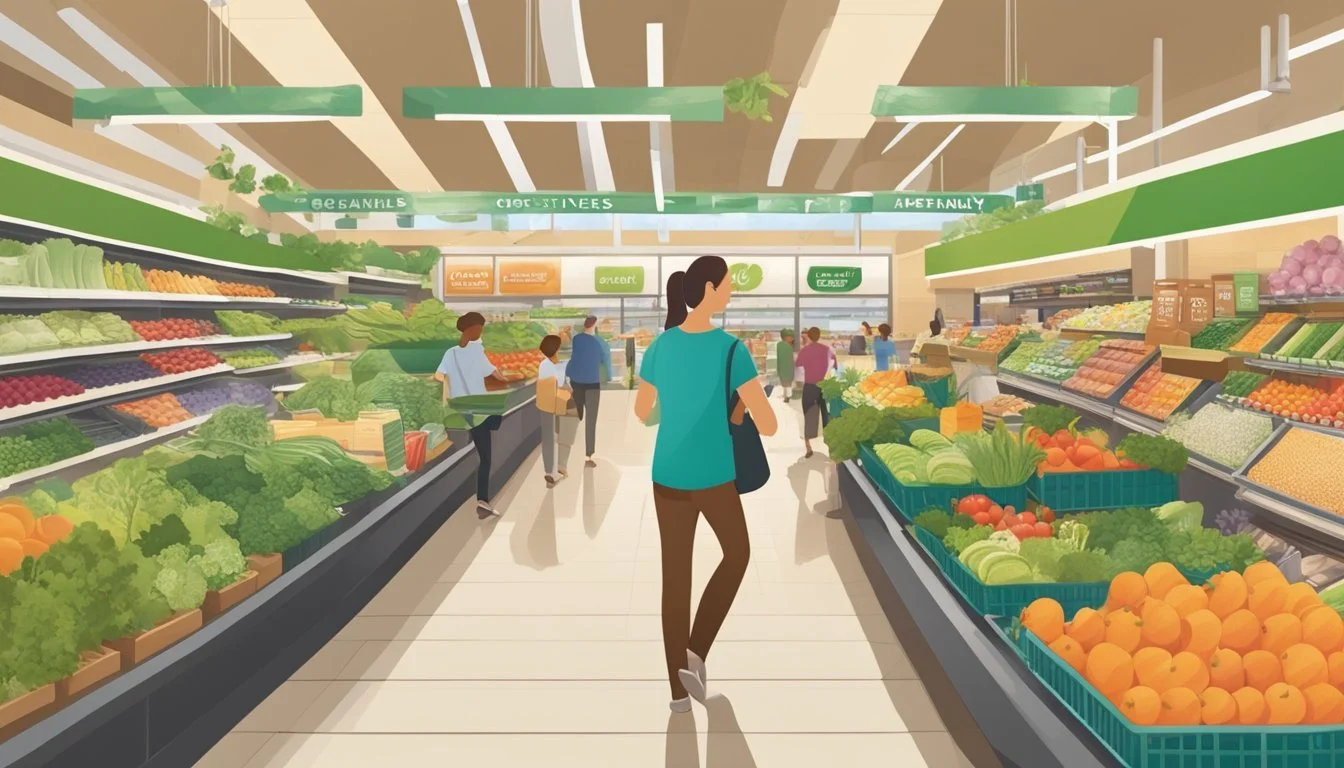Target vs Wegmans
A Comprehensive Comparison of Price, Quality, and Selection
Target and Wegmans are two popular choices for grocery shopping, each offering unique experiences and product selections. Target, known for its trendy merchandise and affordable prices, has expanded its grocery offerings in recent years. Wegmans, a regional supermarket chain, has built a loyal following with its wide variety of high-quality products and excellent customer service.
While both stores have their strengths, Wegmans edges out Target as the better grocery store overall due to its superior fresh produce, extensive selection of prepared foods, and competitive pricing on store-brand items. Target remains a strong contender for shoppers seeking convenience and a mix of grocery and non-grocery items in one trip.
Comparing these two retailers reveals interesting insights into the evolving grocery landscape. Target's focus on convenience and affordability appeals to time-strapped shoppers, while Wegmans caters to those seeking a more premium grocery experience with a wider range of specialty items and gourmet options.
Company Overview
Target and Wegmans are two prominent retail chains that have made significant impacts on the grocery and general merchandise landscape. Both companies have rich histories, distinctive corporate cultures, and strong regional presences that have shaped their growth and success over the decades.
History of Target and Wegmans
Target Corporation traces its roots back to 1902 when George Dayton founded Goodfellow Dry Goods in Minneapolis, Minnesota. The company rebranded as Target in 1962, focusing on discount retail. Target quickly expanded across the United States, becoming known for its trendy yet affordable merchandise.
Wegmans Food Markets began in 1916 as a small grocery store in Rochester, New York. Founded by brothers Walter and John Wegman, the company steadily grew throughout the 20th century. Wegmans built its reputation on high-quality produce, exceptional customer service, and a wide selection of prepared foods.
Target's Corporate Footprint
Target has grown into a major national retailer with over 1,800 stores across all 50 U.S. states. The company employs approximately 350,000 team members and generates annual revenues exceeding $75 billion.
Target's business model combines general merchandise with grocery offerings. Many locations feature:
Full grocery departments
In-store Starbucks cafes
CVS pharmacies
The company has also invested heavily in e-commerce, with same-day delivery and in-store pickup options available nationwide.
Wegmans' Impact on the East Coast
Wegmans has strategically expanded along the East Coast, now operating over 100 stores across seven states. The company employs more than 50,000 people and generates annual sales of approximately $10 billion.
Wegmans stores are known for their:
Expansive fresh produce sections
In-store restaurants and cafes
Extensive prepared food offerings
The company consistently ranks among the top employers in the U.S., with a strong focus on employee development and satisfaction. Wegmans has cultivated a devoted customer base, with some fans traveling long distances to shop at new store openings.
Store Offerings and Features
Target and Wegmans offer distinct shopping experiences with unique product selections and store features. Both chains cater to different customer needs through their diverse offerings.
Grocery Selection
Target provides a streamlined grocery selection focused on everyday essentials and popular brands. The store's grocery aisles feature a mix of pantry staples, frozen foods, and fresh produce. Target's produce section is compact but offers basic fruits and vegetables.
Wegmans, in contrast, boasts an extensive grocery selection. The store is known for its vast produce department, featuring a wide array of fresh fruits and vegetables, including organic options. Wegmans also excels in specialty foods, offering international products and gourmet ingredients.
Both stores stock meats and dairy products, but Wegmans typically provides a more comprehensive selection, including specialty cheeses and premium cuts of meat.
Exclusive Store Brands
Target's private label, Good & Gather, offers a range of food products across various categories. The brand focuses on quality ingredients and value pricing. Target also features other exclusive brands like Market Pantry and Favorite Day for additional grocery options.
Wegmans' store brand is highly regarded for its quality and variety. The Wegmans brand spans numerous product categories, from organic produce to prepared meals. Many customers consider Wegmans' private label products comparable to national brands in terms of quality.
Both stores use their exclusive brands to offer competitive pricing on everyday items.
Prepared Foods and Deli
Target's prepared food options are limited, primarily consisting of grab-and-go items like sandwiches and salads. The store typically does not feature a full-service deli counter.
Wegmans excels in this area, offering an extensive prepared foods section. The store's "Food Bar" includes hot and cold options, from sushi to pizza. Wegmans also provides a full-service deli counter with meats, cheeses, and made-to-order sandwiches.
Wegmans' bakery department is notably larger than Target's, offering a wide selection of fresh-baked goods, including artisanal breads and custom cakes.
Pricing and Affordability
Target and Wegmans have distinct pricing strategies that cater to different consumer needs. Their approaches to discounts, loyalty programs, and everyday prices shape the overall affordability of shopping at each store.
Comparison of Everyday Prices
Target generally offers lower everyday prices compared to Wegmans. The retail giant's pricing is competitive with other major chains like Walmart.
Wegmans, while not the cheapest option, provides reasonable prices for a higher-end grocery experience. Its prices are typically lower than Whole Foods but higher than discount chains like Aldi.
For staple items, Target often beats Wegmans on price. However, Wegmans' store-brand products are competitively priced and may offer better value for certain items.
Discounts and Coupons
Both stores offer various discounts, but their approaches differ. Target frequently runs sales and provides digital coupons through its app.
Wegmans focuses less on coupons and more on consistent pricing. They do offer some weekly specials and digital coupons, but not as extensively as Target.
Target's RedCard provides an additional 5% discount on most purchases, which can lead to significant savings over time. Wegmans doesn't offer a store credit card with similar benefits.
Loyalty Programs
Target's Circle rewards program is free to join and offers 1% back on purchases, birthday rewards, and personalized offers. Members can also vote on which local nonprofits Target should support.
Wegmans' Shoppers Club is also free and provides exclusive discounts on select items. It tracks purchases for easy reordering and enables digital coupons.
Target's program is more robust, offering cash back and a wider range of benefits. Wegmans' program focuses primarily on personalized discounts and shopping convenience.
Both loyalty programs can lead to savings, but Target's Circle program generally provides more opportunities for customers to reduce their overall spending.
Customer Experience
Target and Wegmans offer distinct shopping experiences, each with its own strengths and loyal customer base. Both chains prioritize customer satisfaction but take different approaches to achieve it.
Service Quality and Staff Friendliness
Wegmans is renowned for its exceptional customer service. Employees receive extensive training and are empowered to assist shoppers. They're known for their product knowledge and willingness to go the extra mile.
Target's service is generally reliable, with friendly staff available to help when needed. While not as personalized as Wegmans, Target employees are typically courteous and efficient.
Wegmans consistently ranks high in customer satisfaction surveys, often topping lists for grocery stores. Target also performs well in retail rankings but doesn't specialize solely in groceries.
Store Cleanliness and Layout
Wegmans stores are often described as clean, spacious, and well-organized. The layout is designed to create a pleasant shopping experience, with wide aisles and logical product placement.
Target stores maintain a clean environment but can feel more crowded, especially during busy times. The layout varies by location, with some stores offering a more intuitive grocery section than others.
Both chains prioritize cleanliness, but Wegmans' focus on creating a premium grocery experience is evident in its store design and maintenance.
Online Shopping and Grocery Delivery
Target has invested heavily in its digital presence, offering a user-friendly app and website for online ordering. Same-day delivery is available through Shipt in many areas, and curbside pickup is widely accessible.
Wegmans also provides online ordering and delivery services, though availability may be more limited compared to Target. Their app allows for easy list-making and in-store navigation.
Both retailers have expanded their online offerings in recent years, with Target's broader product range giving it an edge in non-grocery items. Wegmans focuses on quality and freshness in its delivery service, aligning with its in-store reputation.
Brand Perception and Market Position
Target and Wegmans have distinct brand identities in the grocery retail landscape. Their market positioning and consumer perceptions differ significantly, influencing customer loyalty and shopping preferences.
Consumer Ratings and Reviews
Target consistently ranks high in customer satisfaction surveys. A 2023 Newsweek study placed Target among the most trusted grocery retailers in America. Shoppers appreciate Target's clean stores, competitive pricing, and diverse product range.
Wegmans, however, often outperforms Target in grocery-specific ratings. Consumer Reports and Reader's Digest frequently rank Wegmans at the top of their supermarket lists. Customers praise Wegmans for its exceptional quality, extensive product selection, and superior customer service.
Both stores maintain positive reputations, but Wegmans tends to edge out Target in grocery-focused evaluations.
Market Strategies and Consumer Trust
Target positions itself as a one-stop shop, offering groceries alongside other retail categories. This broad approach appeals to convenience-seeking consumers. Target's private label brands, like Good & Gather, have gained trust for quality and value.
Wegmans focuses solely on groceries, emphasizing high-quality products and a curated shopping experience. Their strategy includes in-store dining options and a strong emphasis on fresh, local produce. This specialized approach has cultivated a devoted customer base.
Both retailers prioritize sustainability and ethical sourcing, which resonates with conscious consumers. Wegmans' smaller footprint allows for more personalized community engagement, while Target leverages its national presence for broader market reach.
Sustainability and Ethical Practices
Target and Wegmans both implement eco-friendly initiatives and social responsibility programs. Their approaches differ in scope and focus, impacting product offerings and corporate practices.
Eco-Friendly Products and Packaging
Target emphasizes sustainable packaging in its own brand products. The company aims to make 100% of its owned brand packaging recyclable, reusable, or compostable by 2025. Target offers a growing selection of organic food options, including fresh produce and pantry staples.
Wegmans focuses on reducing plastic waste in its stores. The company has eliminated single-use plastic bags in many locations. Wegmans also provides a wide range of organic products, with over 3,000 organic items available across various departments.
Both retailers have increased their selection of environmentally friendly cleaning products and household goods.
Corporate Social Responsibility
Target's corporate social responsibility efforts include community grants and volunteer programs. The company has committed to reducing its carbon footprint and increasing diversity in its workforce.
Wegmans prioritizes local sourcing and supporting small businesses. The company partners with regional farmers and producers to offer fresh, locally grown products. Wegmans also invests in employee development and community health initiatives.
Both retailers have food donation programs to reduce waste and support local food banks. Target and Wegmans publish annual sustainability reports detailing their progress on environmental and social goals.
Conclusion
Target and Wegmans offer distinct shopping experiences for consumers. Target excels in providing a wide range of non-grocery items alongside its food offerings. The retailer's competitive pricing and frequent sales attract budget-conscious shoppers.
Wegmans, on the other hand, focuses primarily on grocery products. The chain is known for its extensive selection of fresh produce, prepared foods, and specialty items. Wegmans' emphasis on quality and customer service often results in higher customer satisfaction.
For families looking to complete their weekly grocery run, Wegmans may be the preferred choice. The store's layout and product variety cater to comprehensive meal planning and preparation.
Target's convenience factor cannot be overlooked. Its numerous locations and one-stop-shop model appeal to busy consumers who need to purchase both groceries and household items.
Price-sensitive shoppers might find Target more appealing due to its generally lower prices on staple items. However, Wegmans' bulk options and store-brand products can offer significant savings for larger families.
Ultimately, the choice between Target and Wegmans depends on individual preferences and priorities. Consumers must weigh factors such as product selection, pricing, convenience, and shopping atmosphere to determine which grocery chain best suits their needs.







